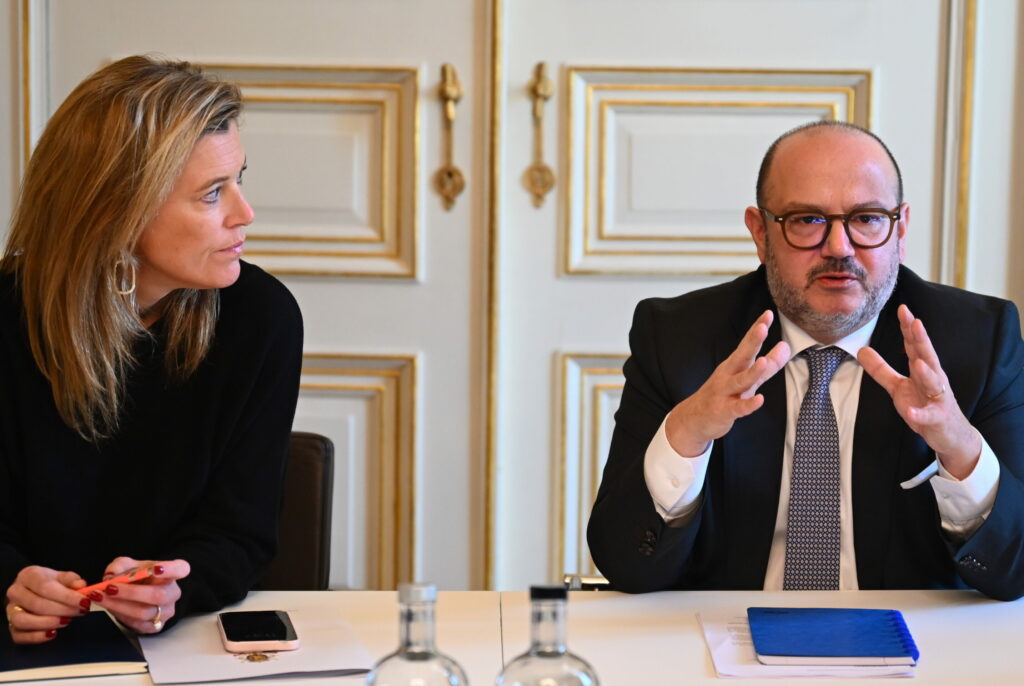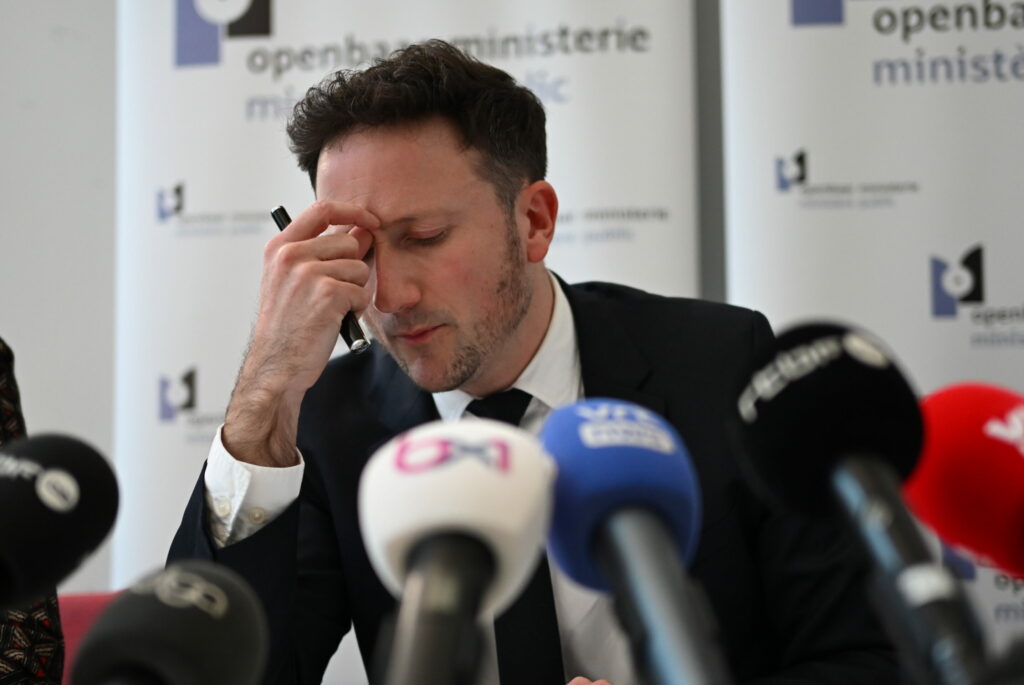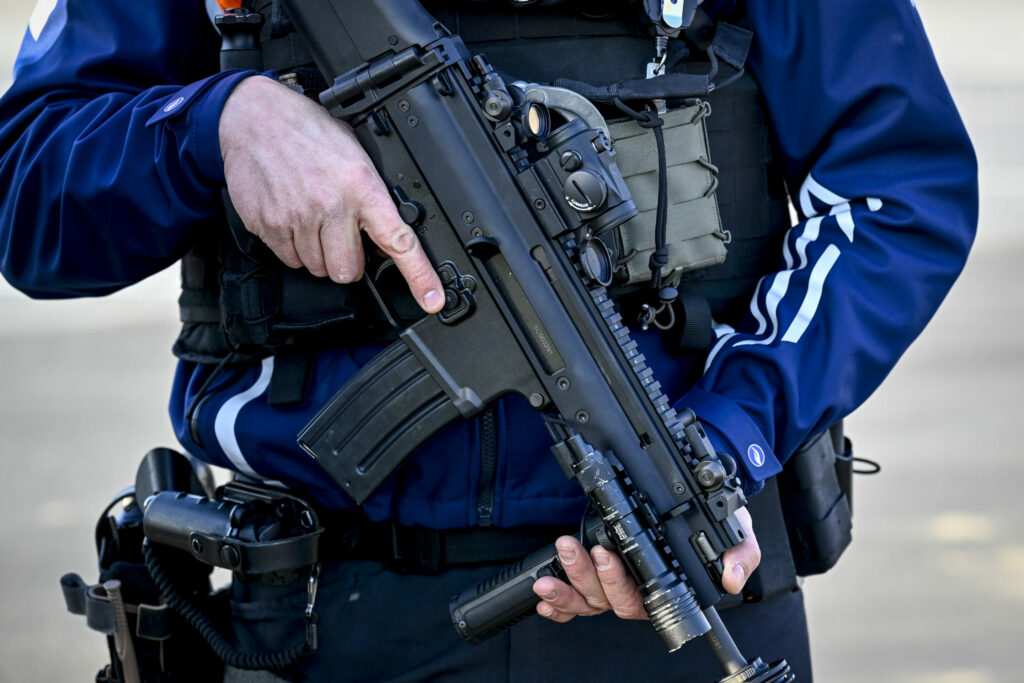Following the recent spate of drug-related shootings in the Brussels municipality of Anderlecht, Brussels' new Public Prosecutor Julien Moinil outlined what he called the "disastrous" situation on the ground when trying to tackle the problem.
Moinil, along with national drugs commissioner Ine Van Wymersch, was invited to a hearing on recent Brussels drug violence by the Brussels Parliament's home affairs committee on Tuesday afternoon. He made a remarkably fiery speech.
Moinil first described how he was called on Saturday night about the deadly shooting at metro station Clemenceau in Anderlecht. When it came to identifying the perpetrators, however, he learned that the Brussels Federal Judicial Police's crime section could not carry out an investigation due to a lack of capacity. "Disastrous," was his verdict.
Calling on the unit for terrorism and human trafficking was briefly considered, Moinil explained, but then dropped, as there could be no question of "further burdening the terrorism department, which is already heavily burdened."
'Shift of powers'
Now, detectives from the Local Police Midi zone are conducting the investigation. "It is disastrous. The Brussels Midi zone with its limited resources now has to do the investigation while weapons of war are being used," said Moinil as he described a "shift of powers."
Speaking on Flemish radio on Tuesday, Justice Minister Annelies Verlinden (CD&V) could not reveal details about the ongoing investigation but stressed that the police and the judiciary are doing everything to stop the violence as soon as possible.
"For this, it is important to be able to catch the principal actors to remove the source of the violence," she said. "First and foremost, we must break the asset gains that dealers make from drug trafficking, something that includes looking at real estate and bitcoins."
However, Verlinden added that local authorities can do more against illegal trafficking and money laundering through petty trading. "We have created an instrument to ensure that those small shops making illegal profits are curbed."
The Brussels-Capital Region can also step its game up, she argues. "[The region] receives a particularly large allocation from the Federal Government to fight for safety, cleanliness and tidiness. I can understand that residents and visitors are questioning the effectiveness given the lack of a Brussels Government."

Justice Minister Annelies Verlinden (left) and Interior Affairs Minister Bernard Quintin organise a meeting to discuss recent shootings incidents. Credit: Belga/Eric Lalmand
However, Moinil stressed that the challenges are "clearly" at the federal level. "I do not want a political war, that is not my role. But it cannot continue like this," Moinil said. He also referred to the promise from Belgium's new Interior Affairs Minister Bernard Quintin (MR) to strengthen the federal police.
During a visit to the port of Antwerp on Tuesday, Quintin assured that he would reinforce the maritime police in the fight against drugs. "Antwerp is the gateway," said Quintin in relation to the situation in Brussels. "It goes without saying that we have to start here with our global approach. The entire chain has to be tackled and that starts here."
The intention to give the maritime police more power in the fight against drug crime was already loudly expressed at the beginning of 2023 – after an 11-year-old girl died in a drug-related shooting in Antwerp. In concrete terms, a plan was made for 312 people in total, while at that time there were only around a hundred staff members active in the service.
"I am not going to put a deadline on when those 100 people will arrive, it is especially important that they receive a good training," said Quintin.
Mountains of work
However Moinil didn't hide his doubts and said that he would be "very vigilant" about the promised reinforcements. Until they arrive, he acknowledged the "mountains of work" that the police on the ground have been doing.
Since January, police arrested 1,347 suspects who went before the public prosecutor's office. These included 310 suspected drug dealers, 93 of whom were immediately detained. 36 minors were included, 17 of whom were placed in institutions.
But the problems with the federal police are not the only ones Moinil has to deal with. He drew attention to prison overcrowding, saying that more than 100 detainees have to sleep on the ground due to a lack of capacity. Detainees are now being transferred to prisons in Oudenaarde (East Flanders province) and Lantin (Liège), as the prisons in Saint-Gilles and Haren are overcrowded.
"Brussels police have to travel all over the country to drop off detainees. Not only are the police struggling with too little capacity, the lack of investment in justice is causing even more discomfort among law enforcement agencies."

Brussels' King's Prosecutor Julien Moinil pictured during a press conference. Credit: Belga/Eric Lalmand
Alternatives such as electronic ankle bracelets exist, but only have a limited deterrent effect for a convicted drug dealer, who might have some €30,000 confiscated but then sits at home and is even given a living allowance. Added to this, the effect of community service sentences also disappears if they are only executed two years later.
Finally, the implementation of punishments is also lacking, Moinil stressed. "The 'weakest' have to serve a greater part of their sentence than the 'strongest': an undocumented migrant convicted of minor offences is more likely to have to serve his full sentence because he is not eligible for early release for lack of permanent address or employment."
By contrast, the big drug traffickers who might have received 10 years in jail but have a permanent address, are released after only a third of their sentence, he lamented. Moinil judged extended penitentiary leave – introduced to combat prison overcrowding by allowing inmates to leave prison every other month – "absolutely mind-boggling."
The Public Prosecutor insisted he is "optimistic" but said it is "time to wake up". Moinil also expressed surprise at the request to testify in the Brussels Parliament, given the Capital Region's powers, but added that it was "an opportunity to speak his mind." He then told the chamber about the body of the 19-year-old he saw on Saturday night, with a bullet in his back.
No more pointing fingers
Moinil concluded that the police response is not equal to the scale of the violence. "I am tired of waking up to shootings. Not because I do not like doing my job – I am very passionate about my work – but because the Belgian citizens, Dutch-speaking and French-speaking Brusselers alike, do not deserve that."
Meanwhile, National Drugs Commissioner Ine Van Wymersch compared the fight against drug crime to an iceberg: the visible part is the shootings, dealing and intimidation, which is tackled through the hotspot strategy.
But to melt the iceberg, she said that the underlying part of the iceberg – which includes poverty, housing issues, mental health and migration as well as corruption, illicit economy, money laundering and landlord-tenant business – must be tackled.
Simply putting more police on the street won't achieve this. To stop people turning to crime, the whole system needs to be addressed – reducing poverty, improving education, and creating a healthy local economy. "Efforts should be made at national, regional and local levels. The time is past when the different levels point at each other," Van Wymersch concluded.

